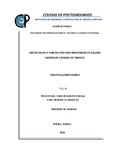| dc.contributor.author | Alvarez Quiroz, Violeta | |
| dc.creator | ALVAREZ QUIROZ, VIOLETA; 555011 | |
| dc.date.accessioned | 2019-06-20T16:59:10Z | |
| dc.date.available | 2019-06-20T16:59:10Z | |
| dc.date.issued | 2016-09 | |
| dc.identifier.uri | http://hdl.handle.net/10521/3511 | |
| dc.description | Tesis (Maestría en Ciencias, especialista en Estrategias para el Desarrollo Agrícola Regional).- Colegio de Postgraduados, 2016. | es_MX |
| dc.description.abstract | A lo largo del tiempo, el uso de la diversidad biológica y cultural ha generado relaciones simbólicas entre los humanos y la naturaleza. Agroecosistemas tradicionales como el huerto familiar-solar representan sitios de conservación en donde existe un profundo conocimiento sobre el manejo de recursos naturales. Lo cual constituye un capital invaluable que permite cohesión social y preservación de la biodiversidad. En México el conocimiento empleado al interior de las comunidades en el tratamiento de enfermedades y padecimientos proviene de la experimentación e interacción entre las diferentes culturas. El trabajo realizado representa una aproximación al uso del cacao y la flora medicinal zoque de una comunidad de Ayapa y de una población chontal de Tucta, Tabasco. Mediante trabajo etnobotánico se registró la información relacionada con el lugar de origen, familias botánicas, nombres científicos y partes empleadas en el tratamiento de enfermedades presentes en los solares. El estudio considera las cualidades frías y calientes de las plantas y de las enfermedades, la cosmovisión y elementos considerados por los habitantes en el tratamiento de enfermedades. Se destaca la participación de los agentes tradicionales de salud de ambas localidades y se reconoce la presencia del sistema frío-caliente como un elemento que contribuye en la conservación de un sistema de salud propio presente desde la época prehispánica, mismo que continua vigente en la culturas zoque de Ayapa y chontal de Tucta. _______________ USE OF CACAO AND MEDICINALS PLANTS IN CHONTAL AND ZOQUE SOLARES OF TABASCO. ABSTRACT: The use of the biological and cultural diversity has created symbolic relations between the humans and nature over time. Traditional agroecosystems like the home garden-solar are conservation sites where deep knowledge about the management of natural resources is generated. This knowledge is an invaluable asset, which enables social cohesion and the conservation of biodiversity. In México the knowledge used by the communities for the treatment of illness and disease comes from the experiences and interactions between different cultures.
This research represents an approximation to the use of cacao and medicinal plants in Ayapa, a Zoque community and Tucta, a Chontal village of Tabasco. Ethnobotanical work was carried out in order to obtain information about the origin, botanical families, scientific names of the medicinal plants kept in the solares. The comprehensive use of these plants in the treatment of different illnesses were also been registered. Hot and cold properties of the plants and the illnesses, the world view of the users and the elements that the habitants take into account when treating illnesses were also considered. It was found that the traditional health agents were very important in both locations. The persistence of a system based on the hot and cold properties of plants and diseases contributes to the conservation of a genuine health system inherited from prehispanic times which is still relevant in both the Zoque community of Ayapa and the Chontal community of Tucta. | es_MX |
| dc.description.sponsorship | Consejo Nacional de Ciencia y Tecnología (CONACyT). | es_MX |
| dc.format | pdf | es_MX |
| dc.language.iso | spa | es_MX |
| dc.rights.uri | http://creativecommons.org/licenses/by-nc-nd/4.0 | es_MX |
| dc.subject | Ayapa | es_MX |
| dc.subject | Cacao | es_MX |
| dc.subject | Huerto familiar-solar | es_MX |
| dc.subject | Plantas medicinales | es_MX |
| dc.subject | Sistema frío-caliente | es_MX |
| dc.subject | Home garden-solar | es_MX |
| dc.subject | Hot and cold system | es_MX |
| dc.subject | Medicinal plants | es_MX |
| dc.subject | EDAR | es_MX |
| dc.subject | Estrategias para el Desarrollo Agrícola Regional | es_MX |
| dc.subject | Maestría | es_MX |
| dc.subject.classification | MEDICINA Y CIENCIAS DE LA SALUD::CIENCIAS MÉDICAS::FARMACOLOGÍA::MEDICAMENTOS NATURALES | es_MX |
| dc.title | Uso de cacao y plantas con fines medicinales en solares chontales y zoques de Tabasco. | es_MX |
| dc.type | Tesis | es_MX |
| Tesis.contributor.advisor | Caso Barrera, Laura | |
| Tesis.contributor.advisor | Aliphat Fernández, Mario Manuel | |
| Tesis.contributor.advisor | Galmiche Tejeda, Ángel | |
| Tesis.date.submitted | 2016-09 | |
| Tesis.date.accesioned | 2017 | |
| Tesis.date.available | 2017 | |
| Tesis.type | Tesis | es_MX |
| Tesis.format.mimetype | pdf | es_MX |
| Tesis.format.extent | 5,991 KB | es_MX |
| Tesis.subject.nal | Agricultura tradicional | es_MX |
| Tesis.subject.nal | Traditional farming | es_MX |
| Tesis.subject.nal | Conocimiento tradicional | es_MX |
| Tesis.subject.nal | Indigenous knowledge | es_MX |
| Tesis.subject.nal | Biodiversidad | es_MX |
| Tesis.subject.nal | Biodiversity | es_MX |
| Tesis.subject.nal | Medicina tradicional | es_MX |
| Tesis.subject.nal | Traditional medicine | es_MX |
| Tesis.subject.nal | Pueblos indígenas | es_MX |
| Tesis.subject.nal | Indigenous peoples | es_MX |
| Tesis.subject.nal | Theobroma cacao | es_MX |
| Tesis.subject.nal | Tucta, Nacajuca, Tabasco, México | es_MX |
| Tesis.subject.nal | Ayapa, Municipio de Jalpa de Méndez, Tabasco, México | es_MX |
| Tesis.rights | Acceso abierto | es_MX |
| Articulos.subject.classification | Plantas medicinales | es_MX |
| dc.type.conacyt | masterThesis | es_MX |
| dc.identificator | 3||32||3209||320904 | es_MX |
| dc.contributor.director | CASO BARRERA, LAURA; 15404 | |
| dc.audience | generalPublic | es_MX |


